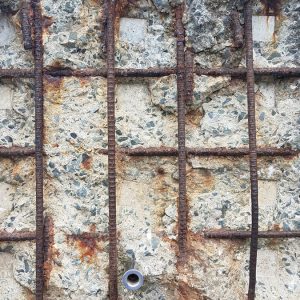What causes concrete to deteriorate?
Concrete may be durable, but that doesn’t mean it is invincible. The porous nature of concrete and the supportive materials within can lead to issues with time. Let’s explore some causes of concrete deterioration and ways to prevent concrete rot.

What causes concrete deterioration?
Water is the most common cause of concrete deterioration. Because concrete is porous, water can seep into the concrete and get to the structure below. This water exposure can rust the steel particles in the concrete and rust the rebar in reinforced concrete. Rusted rebar can expand up to four times its normal size, causing the concrete to break apart. If you’ve noticed any red streaks on your concrete structure, you likely have rust below.
Water infiltration may also dissolve certain concrete ingredients. As this happens, the dissolved ingredients flow with the water and collect on the other side. This process is known as leaching.
What causes concrete corrosion?
Concrete corrosion is typically the result of saltwater exposure or sulfur in the environment. Naturally-occurring saltwater may not be common in Oklahoma, but deposits from salted winter roads can impact your concrete. This is why it is important to clean concrete in the winter months to prevent corrosion.
Sulfur can come from a number of sources, and it is common in industrial communities. This chemical can travel in the air and water, making it difficult to combat against. Sulfur can corrode the ingredients in the concrete mixture, as well as the steel reinforcement bars.
How to prevent concrete rot
The best way to prevent concrete rot is to clean your concrete structures regularly. Repair cracks and drainage issues promptly to minimize water infiltration and oxidation. Preventative steps can save thousands in concrete replacement, and they can significantly extend the life of your concrete.
For more information about concrete cleaning and protection, reach out to JK Industries.
